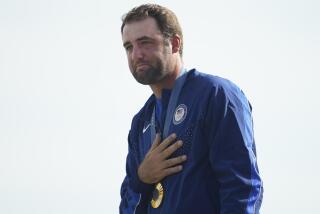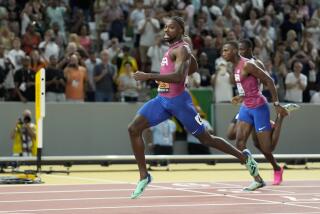DOWNHILL DOWNER
- Share via
HAKUBA, Japan — It took five days to get the men’s Olympic downhill started, but that was nothing compared to getting it finished.
Austria’s Hermann Maier provided a new ski-disaster lead-in to replace the ski jumper on “Wide World of Sports” with a horrific, high-speed, three-somersault, head-slam through two retaining fences . . . but somehow walked away.
Italy’s Luca Cattaneo had to be airlifted out with a torn Achilles’ tendon.
Gate 7 on the Happo’one course was like Turn 3 at Indy in the rain.
Forty-three racers started. Twenty-eight finished.
The Austrians complained, but isn’t that the national pastime?
In a sport where it’s best to leave your nerves at the start gate, 31-year-old Jean-Luc Cretier of France, who had never won an international competition, was crowned Olympic downhill champion on Friday because he was smart enough to recognize trouble when he saw it.
Cretier played it safe around ominous Gate No. 7, made up time elsewhere, and finished with a winning time of 1 minute 50.11 seconds, .40 faster than Norway’s Lasse Kjus, who claimed the silver.
Austria’s Hannes Trinkl won the bronze with a time of 1:50.63.
“I can’t believe it at the moment,” Cretier said of his victory, “although I am sure I will later.”
This was a day when getting off the mountain in one piece was an achievement.
Defending Olympic champion Tommy Moe finished a disappointing 12th with a time of 1:51.43, almost a full second out of medal contention.
Kyle Rasmussen turned in the best American performance, finishing a solid ninth from the 26th position. Rasmussen, who could not race two of the three training runs because of a bad back, missed a bronze medal by .46.
“I skied up to my ability,” Rasmussen said. “This was my kind of course.”
AJ Kitt was one of Gate 7’s 15 victims, and did not finish.
With conditions to his liking and racers spinning off the course in droves, Moe knows he missed another golden opportunity.
“I could see the door wide open,” he said. “I went for it and did the best I could.”
Moe had a chance to make a medal strike from his 17th start position.
Gale-force winds and rain had forced a fourth downhill postponement on Thursday, but Friday gave way to 50-degree sunshine and what Moe called “buttery” snow conditions.
“I don’t have any excuses,” Moe said. “I could have skied better.”
The Olympic downhill turned out not to be a race of brain, not brawn.
The course was much faster than it was last Saturday--the result of soft snow and a tailwind--when racers had their final training run. Some complained that the ill-fated Gate 7 had been moved slightly, forcing racers to take a more direct line entering “Alpen” jump.
Cretier, wearing the No. 3 bib, made the adjustment and actually came out of his tuck to “dump” speed as he neared the gate.
“It was faster than hell coming into it,” Moe would say later. “If you didn’t switch directions real quick, you were going into the fence.”
Austria’s Fritz Strobl, one of the pre-race favorites, barreled into the turn, nearly crashed, and lost precious speed and ended up 11th.
And then came Maier, the World Cup overall leader, who has become known for fearlessness bordering on recklessness.
Taking off right after Cretier, and taking little note of the Frenchman’s conservative line, Maier carried way too much speed into Gate 7, could not navigate the turn and became a human highlight film, his body hurling through the air at 70 mph.
Maier suffered a bruised left shoulder and knee but was otherwise OK. He did not race in the men’s combined downhill later in the day, but, amazingly, he was expected to compete in Saturday’s super-G.
Those who have watched Maier emerge as the world’s greatest all-around skier say he knows no other way to attack a course than to go for its jugular.
“If you are a champion, if you are the favorite, you don’t hold back,” Karl Schranz, the last Austrian to win the World Cup overall title (1970), said after watching Maier’s crash in the finish area.
“You cannot warn a champion. That’s his life, that’s his style, that’s the way he is. That’s why he wins.”
Others say Maier was an accident waiting to happen. His aggressiveness in World Cup downhills this winter has been the talk of the circuit. But, until Friday, Maier had not crashed in a race in more than a year.
“He’s been doing it all year and getting away with it,” Rasmussen said of Maier. “It was only a matter of time before it happened.”
The story of Gate 7 would linger long after the race.
There were rumors circulating that the Austrians and Swiss were going to protest the results because of the course conditions. The downhill start, postponed four times since Sunday, was postponed an hour Friday because of concerns of gusting winds near the top.
Workers had to shave a few millimeters from a critical jump near the top before the course was cleared by officials.
This didn’t go over well with the favored Austrians, who claimed the alterations made the course too technical.
The best ski-proud Austria could manage was Trinkl’s bronze medal, although they went 1-3 in the combined with Mario Reiter and Christian Mayer. Kjus picked up the silver.
“Everybody wants to risk everything at the Olympics,” Trinkl said. “This was a course where you could not do that.”
As for Moe, he’ll also race in Saturday’s super-G, an event in which he claimed a silver medal at the 1994 Lillehammer Olympics--and then make some long-term career decisions.
Moe has not been the same since winning Olympic gold in Norway. Part of it has been because of injury, but he is clearly not skiing with inspiration.
“I need to rejuvenate my confidence,” said Moe, who turns 28 on Tuesday. “I know I can do it, it’s just that there’s such stiff competition, you really have to be hungry.”
That’s the lingering question with Moe. Is he still hungry?
What’s the motivation for a man who won an Olympic gold at age 23 in a country where no one cares about ski racing in the years between?
He would like to still be a factor in four years when the Winter Games will be held at Salt Lake City.
But, by then, Tommy Moe might be Tommy Slow.
“I don’t know if I’ll race in 2002,” Moe said, “unless I get on the podium and have sort of a breakthrough again.”
(BEGIN TEXT OF INFOBOX / INFOGRAPHIC)
MEDALISTS
Alpine Skiing
MEN’S DOWNHILL
Gold: Jean-Luc Cretier, France
Silver: Lasse Kjus, Norway
Bronze: Hannes Tinkl, Austria
More to Read
Go beyond the scoreboard
Get the latest on L.A.'s teams in the daily Sports Report newsletter.
You may occasionally receive promotional content from the Los Angeles Times.







